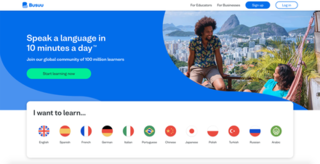Related Research Articles
Language education – the process and practice of teaching a second or foreign language – is primarily a branch of applied linguistics, but can be an interdisciplinary field. There are four main learning categories for language education: communicative competencies, proficiencies, cross-cultural experiences, and multiple literacies.

Rosetta Stone Language Learning is proprietary, computer-assisted language learning (CALL) software published by Rosetta Stone Inc, part of the IXL Learning family of products. The software uses images, text, and sound to teach words and grammar by spaced repetition, without translation. Rosetta Stone calls its approach Dynamic Immersion.
ChinesePod is a web-based Chinese language-learning service composed of multiple key components: video and audio lessons, mobile apps and exercises for characters, pronunciation and dialogue. There are also virtual classroom sessions for private lessons with Mandarin Chinese teachers. The service was founded in June 2004 in Shanghai, by Ken Carroll, Hank Horkoff, and Steve Williams.
The audio-lingual method or Army Method is a method used in teaching foreign languages. It is based on behaviorist theory, which postulates that certain traits of living things, and in this case humans, could be trained through a system of reinforcement. The correct use of a trait would receive positive while incorrect use of that trait would receive negative feedback.
Podcasting refers to the creation and regular distribution of podcasts through the Internet. Podcasts, which can include audio, video, PDF, and ePub files, are subscribed to and downloaded through web syndication or streamed online to a computer or mobile device. Subscribers are then able to view, listen to, and transfer the episodes to a variety of media players, or podcatchers. Though similar to radio, there is no larger regulatory group or oversight with podcasts. Instead, podcasts simply consist of the creators and their listeners. As the technology gained popularity in the early 2000s, the uses of podcasting grew from simply the delivery of content to also creative and responsive purposes.
The First Peoples' Cultural Council (FPCC) is a First Nations governed Crown Corporation of the province of British Columbia, Canada. It is based in Brentwood Bay, British Columbia on Tsartlip First Nation. The organization was formerly known as the First Peoples' Heritage, Language and Culture Council, but shortened its name in 2012.
Tandem language learning is an approach to language acquisition that involves reciprocal language exchange between tandem partners. In this method, each learner ideally serves as a native speaker of the language the other person intends to learn. Tandem language learning deviates from traditional pedagogical practices by eliminating the teacher-student model. Numerous language schools worldwide, including those affiliated with TANDEM International, as well as several universities, incorporate this approach into their language programs.
Babbel GmbH, operating as Babbel, is a German subscription-based language learning software and e-learning platform, available in various languages since January 2008.

Busuu is a language learning platform on web, iOS and Android that allows users to interact with native speakers. In 2021, Chegg acquired Busuu for $436 million.
Mobile-assisted language learning (MALL) is language learning that is assisted or enhanced through the use of a handheld mobile device.
Mobile translation is any electronic device or software application that provides audio translation. The concept includes any handheld electronic device that is specifically designed for audio translation. It also includes any machine translation service or software application for hand-held devices, including mobile telephones, Pocket PCs, and PDAs. Mobile translation provides hand-held device users with the advantage of instantaneous and non-mediated translation from one human language to another, usually against a service fee that is, nevertheless, significantly smaller than a human translator charges.
Augmented learning is an on-demand learning technique where the environment adapts to the learner. By providing remediation on-demand, learners can gain greater understanding of a topic while stimulating discovery and learning. Technologies incorporating rich media and interaction have demonstrated the educational potential that scholars, teachers and students are embracing. Instead of focusing on memorization, the learner experiences an adaptive learning experience based upon the current context. The augmented content can be dynamically tailored to the learner's natural environment by displaying text, images, video or even playing audio. This additional information is commonly shown in a pop-up window for computer-based environments.
Virtual worlds are playing an increasingly important role in education, especially in language learning. By March 2007 it was estimated that over 200 universities or academic institutions were involved in Second Life. Joe Miller, Linden Lab Vice President of Platform and Technology Development, claimed in 2009 that "Language learning is the most common education-based activity in Second Life". Many mainstream language institutes and private language schools are now using 3D virtual environments to support language learning.

Pimsleur Language Programs is an American language learning company that develops and publishes courses based on the Pimsleur method. It is a division of Simon & Schuster, a publishing company which is a subsidiary of Kohlberg Kravis Roberts. Pimsleur offers courses for 50 languages with English as the source language, and 14 ESL courses.

Duolingo, Inc., is an American educational technology company that produces learning apps and provides language certification. Duolingo offers courses on music, math, and 43 languages, ranging from English, French, and Spanish to less commonly studied languages such as Welsh, Irish, and Navajo. The learning method incorporates gamification to motivate users with points and rewards and interactive lessons featuring spaced repetition. The app promotes short, daily lessons for consistent-phased practice.
Pronunciator is a set of webpages, audio and video files, and mobile apps for learning any of 87 languages. Explanations are available in 50 languages. 1,500 libraries in the US and Canada subscribe and make it available free to their members, including state-wide in Texas, North Carolina, Louisiana, and Arkansas.
Reverso is a French company specialized in AI-based language tools, translation aids, and language services. These include online translation based on neural machine translation (NMT), contextual dictionaries, online bilingual concordances, grammar and spell checking and conjugation tools.

Epic! is an American kids subscription-based reading and learning platform. It offers access to books and videos for children ages 12 and under. The service can be used on desktop and mobile devices.

Tandem is a language exchange app on iOS and Android that connects language learners with native speakers. Members can search for language exchange partners to talk to by either text or voice chat. As of October 2023, the app supports more than 300 languages, including 20 sign languages, 20 indigenous languages and six fictional ones, such as Mandalorian or Klingon.
References
- ↑ Arvanitis, P.; P. Krystalli; P. Panagiotidis (2016). "APPLICATIONS FOR MOBILE ASSISTED LANGUAGE LEARNING: A CURRENT FIELD RESEARCH". INTED 2016: Conference Proceedings. [Valencia]: Iated. pp. 7645–7651. ISBN 978-84-608-5617-7. OCLC 953001081 – via Academia.
- ↑ Sabitzer, Barbara; Stefan Pasterk (2014). "Mobile Learning for COOL Informatics Cooperative Open Learning in a Vocational High School" (PDF). pp. 232–238 – via CSEDU 2014 - 6th International Conference on Computer Supported Education.
- ↑ Snyder, Robin (2015). "Ideas on Learning a New Language Intertwined With the Current State of Natural Language Processing and Computational Linguistics" (PDF). 2015 ASCUE Proceedings: 75–85. ERIC ED571252.
- ↑ Grov, Camilla Tuft (Spring 2015). "Digital learning for smartphone language applications: The use of feedback in an app for Norwegians who want to learn Spanish" (PDF)– via Gjøvik University College.
- ↑ Haelewyck, Stijn. "L'acquisition du français à l'usage d'applications mobiles: un état de question" (PDF)– via Universiteit Gent.
- ↑ Andrade Montejo, Sandra (2013-06-05). "Aprende ruso" (PDF)– via Universitat Politècnica de Catalunya.
- ↑ "English US - English UK for beginners - Table of contents". www.50languages.com. Retrieved 2017-10-02.
- ↑ Hooper, Rowan (2017-01-28). "You had me at hallå". New Scientist. 233 (3110): 42–43. Bibcode:2017NewSc.233...42H. doi:10.1016/S0262-4079(17)30182-3.
- ↑ HOADJLI, Ahmed Chaouki/ MANSEUR Raouia (2016-03-01). "Can Shadowing Enhance EFL Learners' Oral Performance? A case study". Revue des Sciences Humaines. 43: 99–109. Archived from the original on 2017-10-03. Retrieved 2017-10-03– via Université Mohamed Khider Biskra.
- ↑ "Book 2 Voices". www.goethe-verlag.com. Retrieved 2017-10-03.
- ↑ "Learn languages online or with Android and iPhone app for free". www.50languages.com. Retrieved 2017-10-03.
- ↑ "Unbenanntes Dokument". www.goethe-verlag.com. Retrieved 2017-10-03.
- ↑ "Haftungsausschluss - Disclaimer". www.goethe-verlag.com. Retrieved 2017-10-03.